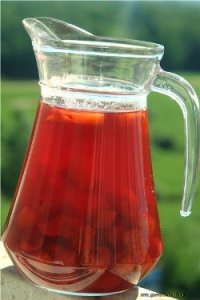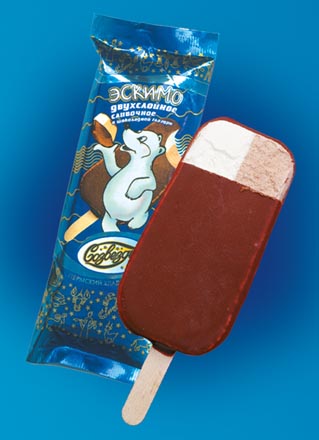Бутылка
Ok readers, guess today's word!

♪ Take one down, pass it around, ♫
♪ 98 bottles of beer on the wall…98 bottles of beer! ♫
The Russian word for bottle is бутылка. As far as I can tell there is, thankfully, no equivalent of the “99 bottles” song in Russian. If you want to describe a smaller bottle without saying “small bottle,” say бутылочка. It sounds so small and cute!

Here is how бутылка declines:
| Sg | Pl | |
| Nom | бутылка | бутылки |
| Acc | бутылку | бутылки |
| Gen | бутылки | бутылок |
| Pre | бутылке | бутылках |
| Dat | бутылке | бутылкам |
| Ins | бутылкой | бутылками |
And some sentence examples:
Ты куда сунул бутылку шампуня?
Where did you stuff the shampoo bottle?
Что, слепой? Бутылка перед тобой. На полке!
What, are you blind? The bottle is in front of you. On the shelf!
Эти бутылки водки проданы.
These bottles of vodka are sold.
Пожалуйста, передайте мне бутылочку Пепси.
Please pass me the little bottle of Pepsi.
Компот
 This morning I was reading about the Korean drink hwachae and realized “Hey, this is basically the same thing as компот!”
This morning I was reading about the Korean drink hwachae and realized “Hey, this is basically the same thing as компот!”
What is компот? It is a beverage made, essentially, by boiling fruit in water with some sugar and then letting the liquid cool down. You can make компот out of all sorts of fruit, fresh or dried. When you put a pitcher of it on the table, you leave the marvelous chunks of fruit in, not straining it out. The Grandma's Advice website lists the following versions:
|
|
It's a great summer drink of course, but the Russians will drink it in winter, too. Here are some sample sentences:
| Ещё компот, пожалуйста. | More compote, please. |
| Мама налила всем компот и поставила на стол тарелку с печеньем. | Mom poured compote for everybody and set a plate of cookies on the table. |
| — Очень вкусный компот! — Да, в нём и яблоки и груши. |
“Very tasty compote!” “Yes, it has both apples and pears in it.” |
| — Какой это компот? — Компот из айвы. — Я даже не знаю, что такое айва. |
“What kind of compote is this?” “Compote made from quinces.” “I don't even know what a quince is.” |
Голосовать

Soon we are coming up on November 2nd, that means Voting Day. The Russian word голосовать means to vote. Тhe root of the word is голос, which means voice. This captures the idea behind having the right to vote so well! The whole point is to make your voice heard.
Я собираюсь голосовать во вторник.
I am going to vote on Tuesday.
While there is no presidential election this year, I still think it's pretty important to go to the polls. Just from watching a bit of the news (it's usually so negative that I can only watch so much) we can tell that quite a few senators, governors, and other local politicians are up for election this year.
В Аризоне мы голосуем за сенатора.*
In Arizona we are voting for a senator.
Of course, there are plenty of rules to follow to try to keep the voting fair and square. For example, you must be 18 years old.
Машенька ещё не может голосовать — ей семнадцать.*
Masha is seventeen, so she can't vote yet.
Nowadays we don't just vote in the political arena. Many reality shows feature polls as a kind of gimmick to get the viewers really committed. And it works too. Some of these shows gеt so many votes that phone lines are overloaded.
Миллион американцeв проголосовали за того парня, который пел так хорошо.
А million Americans voted for that guy who can sang so well.
So whatever the situation, make your votes count. And remember...

*Notice how in the present tense you would not say "голосовает" or "голосоваем." Instead you take off the "овать" end of the word and replace it with "у" and then conjugate it per the rules.
Откуда
If you want to know where someone has arrived from, the word you use is the interrogative adverb откуда “from where”:
| Откуда ты пришёл? Откуда ты приехал? |
Where have you come from? |
Of course answering the question is quite complex since there are at least three different words that mean ‘from’ in Russian. (If you would like a thorough overview to the to/from/at words and their use, click here.) Very often people will use the word without including a verb of motion. If they have just met you, they usually mean it in the sense of “What is your national or local origin?”
| — Откуда вы? — Я из Америки. |
“Where are you from?” “I'm from America.” |
| — Откуда он? — Он с Камчатки. |
“Where is he from?” “He is from Kamchatka.” |
| — Откуда она? — Ты не узнал по произношению? Она из Одессы. |
“Where is she from?” “Couldn't you tell by her pronunciation? She is from Odessa.” |
Откуда is often used in sentences talking about the source of someone's information. In that context it is best translated as ‘how’:
| — Откуда ты знаешь Пашу? — Мы вместе учились в школе. |
“How do you know Pavel?” “We went to school together.” |
| — Откуда ты узнала, что я попал в аварию? — Угадать не трудно. Твоей машины всю неделю не видно, и ты ходишь в гипсе. |
“How did you figure out that I was in an accident?” “It wasn't hard to figure out. Your car hasn't been around all week, and you are walking around in a cast.” |
| — Откуда ты знаешь столько русской грамматики, a я ничего не знаю? — Я каждый день готовлюсь к урокам, а ты всё тянешь до последнего момента. Другими словами, я хорошая студентка, а ты лентяй. |
“How come you know so much Russian grammar when I don't know anything?” “I do my homework every day, and you put off everything till the last moment. In other words, I'm a good student, and you are a lazy bum.” |
Выбирать/выбрать
Выбирать is the Russian word for "to choose," "to select" or "to pick." Here is how you conjugate the verb:
| Imperfective | Perfective | |
| Infinitive | выбирать | выбрать |
| Past | выбирал выбирала выбирало выбирали |
выбрал выбрал выбрала выбрало выбрали |
| Present | выбираю выбираешь выбирает выбираем выбираете выбирают |
No such thing as perfective present in Russian. |
| Future |
буду выбирать будешь выбирать будет выбирать будем выбирать будете выбирать будут выбирать |
выберу выберешь выберет выберем выберете выберут |
| Imperative | выбирай(те) | выбери(те) |
So let's look at some examples using my favorite dessert, ice cream.
Мама с детьми пошли за мороженым.
Mom took the kids out for ice cream.
Она сказала: «Выбирайте для себя по два сорта.»
Pick out two flavors for yourselves.
Нина выбрала клубничное и ванильное мороженое.
Nina chose strawberry and a vanilla ice cream.
A Костя выбрал шоколадное и малиновое мороженое.
And Kostya picked chocolate and raspberry ice cream.
Я всегда выбираю эскимо.
I always choose the chocolate-covered ice cream bar.

<< 1 ... 45 46 47 ...48 ...49 50 51 ...52 ...53 54 55 ... 158 >>